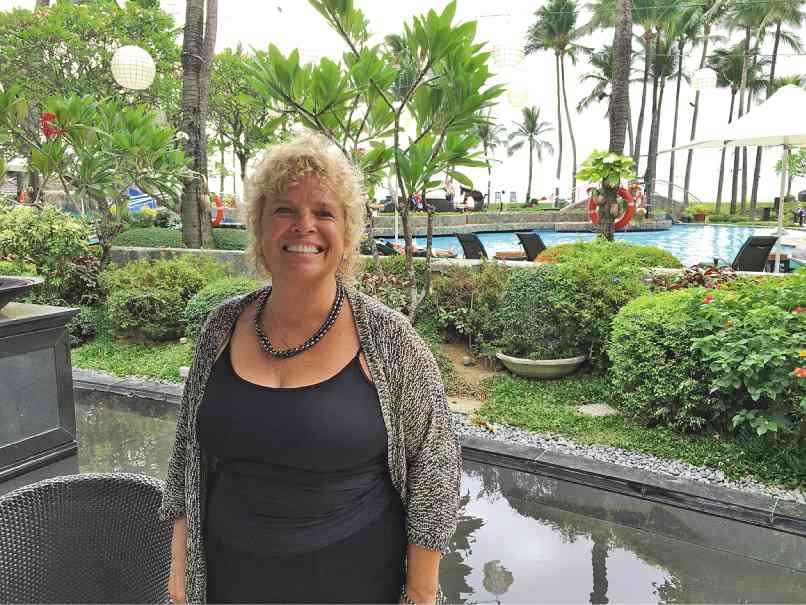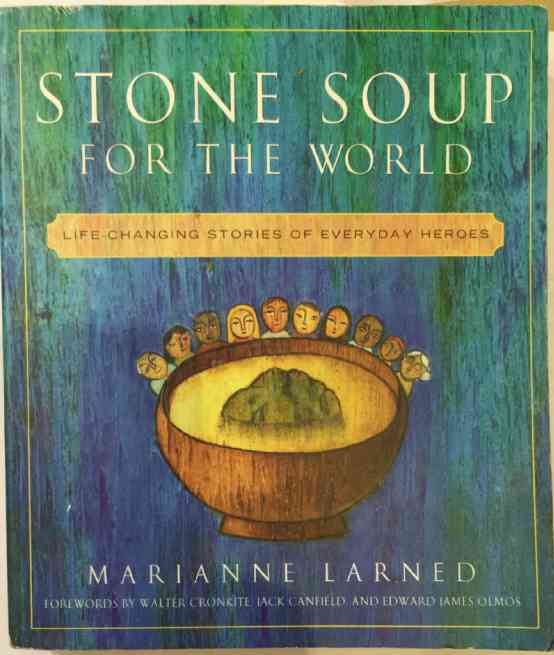Stone Soup for the soul
After seeing the visual of starving children in Ethiopia, Isis Johnson, an American child aged 4, felt the desire, even at her tender age, to help.
She asked her grandmother if she could donate their leftover chicken. Her grandmother said that Ethiopia was too far away. Still, not wanting to waste their food, she asked if there were hungry children in their community that they could donate their chicken to.
When she found out there were, she went door to door in their neighborhood asking for food donations for the hungry children.
Soon, people started bringing food to Isis Johnson and their home became full of donated food and supplies.
With the help of her grandmother, Isis was then able to contact the Salvation Army, which helped deliver over one thousand items of food collected to hundreds of people.
Isis made the NBC Nightly News, among other shows, and suddenly, she was getting calls from New Orleans. Everyone wanted to help.
Today, she has a foundation in her name, the Isis T. Johnson Foundation.
When Hurricane Andrew hit Louisiana, she was able to promptly collect over 1,600 pieces of clothing for the Red Cross to distribute to needy families. They continue to help the needy in their not-so-small way. Johnson, in interviews, explains, “You don’t have to be old to make things better, you only have to care.”
* * *
Another inspiring story is that of 11-year old David Levitt.
When David heard about USA Harvest, a foundation where volunteers transport food donations to hungry people, with the motto, “Feed the Hungry Without Money,” he wanted a similar program where school cafeterias donate leftover food to the hungry created at his school.
Mind you, David was just a sixth grader at this point.
His school principal told him that it was not possible because of government regulations.
Yet David, still not discouraged, researched on the regulations, wrote a proposal and submitted this to the County School Board!
Then he called each of the board members. Impressed by his determination, the board unanimously approved David’s proposal.
When the project finally began, 10 schools donated their leftover lunches to soup kitchens and local shelters. As of the writing of Stone Soup, 110 schools in David’s county participate in the program.
* * *
This book Stone Soup for the World by author Marianne Larned is full of stories like these.
Stone Soup is actually an old folk’s tale.
A traveler had run out of food and knocked on doors but no one would help him. Until someone offered water. He gratefully accepted then started heating it. Passersby asked him what he was cooking. He said, “I’m making stone soup.” What does it taste like, they asked. “Well, it would be better if it had onions.” Curious at the turnout, villagers started donating various ingredients—carrots, potatoes, until the traveler had a delicious soup he could share with the villagers.
The moral of the story is that one bright idea—who would ever think of creating “stone soup”?!—can spark a movement that would benefit a whole village. And before you know it, everyone is benefiting from the “stone soup.”
* * *
One inspiring lady in the food community I have the privilege of knowing and whose stories I follow via her column in ManilaSpeak.com is EchoStore founder, coffee expert and slow food advocate Chit Juan. Echostore is a shop (for branches, visit echostore.ph) that advocates a sustainable lifestyle, using natural and organic products. Some of its products come from its own farm, EchoFarm.
I remember her because of a Stone Soup-worthy idea that she shared during ManilaSpeak: creating farm schools out of farms.
The idea is actually Senator Cynthia Villar’s, who heads the Senate Committee on Agriculture and had noticed that of the almost 12 million farm workers in the country, most need help in basic financial management, technology and entrepreneurial skills.
So she suggested that Chit and company convert EchoFarm into a “farm school.” This way, they could teach farm workers other skills such as simple entrepreneurship.
Chit now encourages that if you have a farm, you can convert it into a farm school as well.
And here is what is encouraging: Tesda can even pay you for training these farmers. How can you put up your own farm and farm school?
Get ideas by attending the course Training the Trainors of Agricultural Training Institute (ATI) that Senator Villar conducts in her Las Piñas farm for free.
* * *
Another great Stone Soup-like story involves Italy’s No. 1 chef Massimo Bottura, whose restaurant Osteria Francescana is currently No. 2 on the list of World’s 50 Best Restaurants.
The earthquakes that shook the Emilia-Romagna region in May 2012 damaged nearly 1,000 wheels of Parmigiano Reggiano. It was utter devastation for this industry and the producers called on the celebrity chef, by then a global sensation for his restaurant that was reinventing Italian cuisine.
What Bottura did was nothing short of brilliant.
Using his culinary genius, he found a way to utilize the damaged wheels of cheese by creating a unique recipe that paid tribute to the devastated region.
Sourcing rice from the small villages in the area affected by the earthquake, Bottura used the Parmigiano which, by a creative process separates the cheese into three parts: protein solids on the bottom, a thick broth in the middle, and a Parmigiano cream on top.
The cheese broth is added to the rice and topped with the cream of parmesan, creating a simple yet delicious dish that became a symbol of hope, at the same time rescuing what would have been an extremely damaged industry.
Soon, restaurants all over were using Bottura’s recipe for risotto cacio e pepe, and what started as a “social gesture” turned into what he called “our revolution with risotto.”
* * *
If you can, get a copy of this book.
Alternatively, you can visit Larned’s new website TouchstoneLeaders.com, which seeks to be a platform for developing what I would call “stone soup chefs.”
The site is tied up with the Stone Soup Leadership Institute (visit soup4worldinstitute.com) which through its various projects seeks to support “stone soup leaders” around the world.
I’m still not quite sure how the institute chooses its beneficiaries or awardees but of this I am certain: the stories in Larned’s book are all very inspiring. And the message is that you can be a stone soup leader on your own.
Make your own movement, go reach out and make some stone soup. Water and a bright idea are all that you need.
Time to cook some ’stone soup!’


